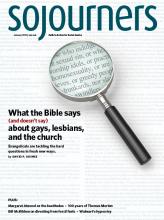THE MOOD ALONG Central Park West couldn’t have been sweeter: As block after block after block of scientists and students and clerics strolled by on the People’s Climate March, everyone was smiling. Serious, yes—but calm. Determined, but hopeful. It was a coming out party, and everyone was reassured to see how big and broad this movement actually was.
And everyone was relieved, I think, not to have to listen to speeches. Without politicians explaining what the day was all about, the march was able to speak for itself, with a mix of anger and inspiration exemplified by the front- line communities and Indigenous nations that filled out the first ranks of the procession.
That night, though, there were a couple of speeches worth listening to. They came further up the West Side, at the Cathedral of St. John the Divine, where religious leaders had gathered for a series of meetings and services. At the reception following those talks, Stephen Heintz, the head of the Rockefeller Brothers Fund, cued up a video address from Desmond Tutu, calling for “an end to the fossil-fuel era.” Dressed in his scarlet robes, Tutu saluted activists, saying “the destruction of the Earth’s environment is the human rights challenge of our time,” and demanded that institutions around the planet end their investments in fossil-fuel companies.
Read the Full Article

